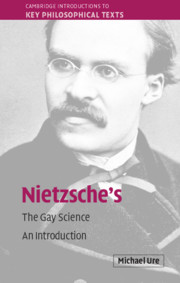Book contents
- Nietzsche’s The Gay Science
- Cambridge Introductions to Key Philosophical Texts
- Nietzsche’s The Gay Science
- Copyright page
- Contents
- Acknowledgements
- Abbreviations
- Introduction
- Chapter 1 Nietzsche’s Tragicomedy
- Chapter 2 Nietzsche’s New Nobility: Book 1
- Chapter 3 Redeeming Art: Book 2
- Chapter 4 Shadows of God: Book 3
- Chapter 5 Sanctus Januarius: Book 4
- Chapter 6 Eternal Recurrence: Personal Infinity
- Chapter 7 Dionysian Pessimism: Book 5
- Chapter 8 Nietzsche’s Saturnalia: 1886 Preface
- References
- Index
- References
References
Published online by Cambridge University Press: 09 May 2019
- Nietzsche’s The Gay Science
- Cambridge Introductions to Key Philosophical Texts
- Nietzsche’s The Gay Science
- Copyright page
- Contents
- Acknowledgements
- Abbreviations
- Introduction
- Chapter 1 Nietzsche’s Tragicomedy
- Chapter 2 Nietzsche’s New Nobility: Book 1
- Chapter 3 Redeeming Art: Book 2
- Chapter 4 Shadows of God: Book 3
- Chapter 5 Sanctus Januarius: Book 4
- Chapter 6 Eternal Recurrence: Personal Infinity
- Chapter 7 Dionysian Pessimism: Book 5
- Chapter 8 Nietzsche’s Saturnalia: 1886 Preface
- References
- Index
- References
- Type
- Chapter
- Information
- Nietzsche's The Gay ScienceAn Introduction, pp. 252 - 264Publisher: Cambridge University PressPrint publication year: 2019



